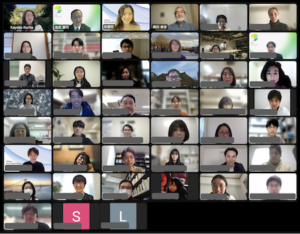The Certificate Award Ceremony for the 19th “The University of Tokyo Future Faculty Program (UTokyo FFP)” and The University of Tokyo Future Faculty Development Program (UTokyo Global FFDP) was held on Zoom on Thursday, September 15th, 2023.
Fifty-four participants completed the 19th UTokyo FFP, and fourteen participants completed the 1st UTokyo Global FFDP. Each of them received a certificate. They had a congratulatory address from Prof. Yasushi Asami, Director of the Center for Research and Development of Higher Education, The University of Tokyo.
Later, UTokyo FFP alumni appeared as guest speakers and explained their various activities after completing the program and introduced the alumni network. From UTokyo Global FFDP, the representative of the 1st edition gave a speech.
UTokyo FFP is a program for graduate students, postdocs, and faculty/staff members to enhance their teaching competences by creating syllabi, conducting microteaching and so on.
UTokyo FFP has produced a total of 903 people who completed the program coming from every graduate school at The University of Tokyo.
The 20th UTokyo FFP is scheduled to start in October, AY2023, and the application is open now through the following link.
→https://dev2.utokyofd.com/ffp/attend.html
The 2nd edition of UTokyo Global FFDP is scheduled to start in April, AY2023.


 (The image of students working in pairs)
(The image of students working in pairs) (The image of group activity)
(The image of group activity)


